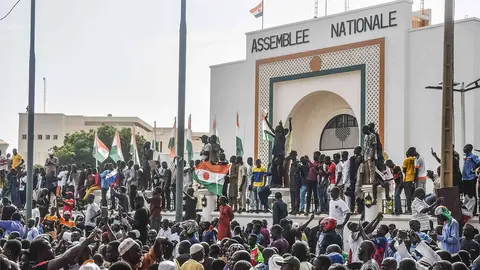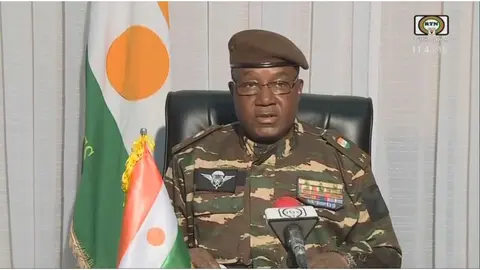Niger and the Sahel powder keg

The Spanish armed forces have been warning of this for several years. And so have analysts at the Spanish Institute of Strategic Studies of CESEDEN or the Gutiérrez Mellado Institute, to cite two important security research centres. The Western Sahel - Mauritania, Mali, Niger, Burkina Faso and Chad - is a range of instability surrounding the western Mediterranean and the Strait of Gibraltar that needs to be observed as a strategic priority for national defence. Desired by the various interests of the new powers, Russia, China and Turkey; infected by jihadist terrorism that seeks to control territories in the region and gain sources of funding through oil and other resources; politically and economically unstructured and with a strong anti-European and post-colonial sentiment that has been fuelled by the perverse narratives of jihadism and the Russian mercenaries of the Wagner group.
The coup d'état in Niger, the second against the progressive president Mohamed Bazoum in just two years, is the chronicle of a confrontation foretold and denounced by Western security services. The progressive European and American presidents have not wanted to see it, nor have they understood it.
A decade ago, when terrorists were defeated in Afghanistan and the Middle East by US and allied intervention in response to the Twin Towers atrocity, and then bled each other dry in the horrific war in Syria, jihadist groups set their sights on the Sahel. A complex and tribally divided territory, impoverished and politically hopeless.
The region became a transit hotbed for illegal immigration, used as a weapon to destabilise the European Union and the Mediterranean, and a platform for accessing energy sources and harassing producer countries (Nigeria). Boko Haram emerged in Niger to replace in Africa the threat to the West that the Islamic State and earlier al-Qaeda had developed in the Middle East. Today, the so-called Islamic and Muslim Support Group (akin to al-Qaeda) and the Islamic State of the Greater Sahara (loyal to Daesh) remain active in the area.
But also understood as a region with the capacity for geopolitical influence, with the exit to the Gulf of Guinea and the possibility of promoting a weak government in Mauritania in order to establish stable bases in the South Atlantic, the Western Sahel has become a strategic space for the great powers. For Russia, in terms of political and military power from which to threaten (Mali) NATO's southern flank. And for China in economic and political terms to deploy its influence in Africa and rally anti-Western sentiments in the Global South as a whole. Turkey, for its part, sees the Sahel as an umbrella for its North African and Eastern Mediterranean policy, which it has highlighted at the NATO summit where it has secured a greater Atlantic security effort in the sub-region.
Europe, self-injured by polarisation and undefined in its strategic objectives, has seen its presence in Africa weakened. France is the most tangible example of the regrettable consequences of not giving today's hybrid conflicts the importance they really have. A few weeks before this coup in Niger, a wave of extreme, unjustifiable and unwarranted violence swept through the country and once again put Macron's government on the ropes. Internal weakness irreversibly leads to external weakness. But, despite seeing this trend day after day in countries as close as France, as important as the United States, or in our own country, beset by recent radical and secessionist political processes, supposedly well-informed Western democratic societies turn their backs on the fact that competition between powers is being waged simultaneously in the trenches of Ukraine, in the guerrilla and mercenary activity of the Sahel, in the streets of Barcelona and Paris, and in the institutions of Madrid and Washington.
Handcuffed by their internal weakness, European leaders are unable to react to the complexity of an order of rivalry and confrontation that does not manifest itself in a one-off event or a resolvable crisis. Rather, it is projected onto the totality of current international dynamics and conflicts. The President of the Council of Ministers of the European Union and Spain, Pedro Sánchez, was surprised by the coup d'état in Niger while on holiday in Morocco. Morocco is a key country for regional stability and at the same time a permanent threat to its own stability due to its growing rivalry with Algeria, along long kilometres of border with the Sahel. A high-risk situation, especially for Spain.




